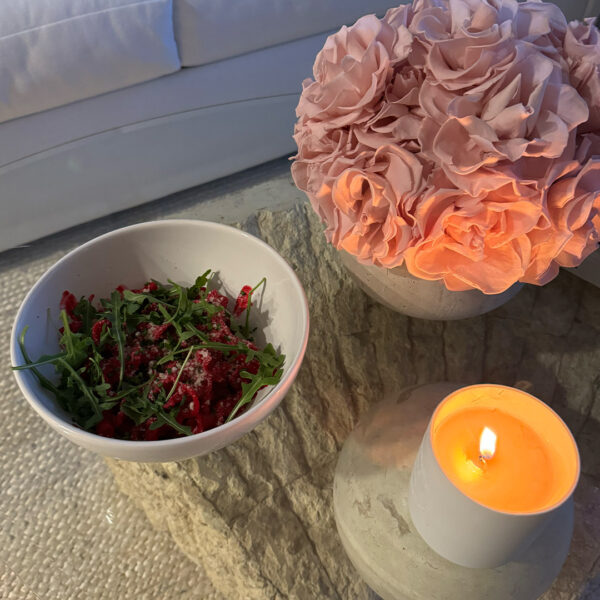Short on time? Poosh here for the summary.
Waking up in the middle of the night is never pleasant. Waking up and not being able to fall back to sleep makes it even less so. There are a few possible reasons why you wake up and lay in bed, staring at the ceiling. Luckily, there are also ways to drift back off to sleep or avoid those nightly wakings altogether.
Why we wake up in the middle of the night:
1. You have low blood sugar.
Hypoglycemia (or low glucose levels) can definitely be the culprit of a middle-of-the-night waking.
During the night, your liver works hard to metabolize glucose. If you eat dinner at 5 p.m. or 6 p.m. and then nothing else until breakfast the next morning, your blood sugar level may get too low throughout the night. This puts stress on the body, causing it to secrete cortisol from the adrenal glands. Cortisol is one of our stress hormones, which suppresses our natural sleep hormone melatonin. Cortisol also makes it tough to stay calm and relaxed, so when you wake up with high stress levels, falling back asleep becomes difficult.
A small snack with protein and fiber can help stabilize your blood sugar while you’re sleeping. Try any of the healthy bedtime snacks below.
- Two handfuls of raw pumpkin seeds (not in the shell)
- A piece of bread with peanut butter (ideally, peanut butter with 5g of protein per serving)
- Hard-boiled egg
- Legumes like chickpeas, beans, nuts, seeds
- Protein shake or protein bar
- Veggies, crackers, or pita dipped in hummus
Midnight bathroom breaks happen and after crawling back into bed, you may find yourself tossing and turning, unable to fall back to sleep.
Try to prevent the middle-of-the-night need to pee by monitoring all fluids before you go to bed. Avoid drinking diuretics like alcohol or caffeinated beverages, which encourage the body to release extra fluids.
If you do wake up to go to the bathroom, practice these steps to help you go back to sleep:
- Don’t turn on every light. It only takes a short time of exposure to light for the sleep switch to turn off in our brain. Turning the lights on in the middle of the night tricks our brain into thinking it’s time to wake up even though we want to go back to sleep. Since LED lights are common in many homes, be sure to choose the right color light bulb for table lamps and night lights. Choose red, orange, or yellow to encourage the body to continue to sleep.
- Stop clock-watching. We’re all guilty of it! Checking the time and watching the clock becomes a job that robs us of sleep. The dreaded clock countdown is a huge sleep buster, so just set your alarm and then turn your clock around or hide it. If you know the alarm is set, you don’t need to know what time it is.
3. You’re too hot or too cold.
Throughout the night, we want our body to focus on one thing only—sleeping. If our body is busy regulating our temperature throughout the night, it can’t focus on deep, restorative sleep. A cooler bedroom environment with a temperature of 65 degrees is optimal.
Try these tips to stay comfortable:
- Dress accordingly. If you are a hot sleeper, focus on more breathable fabrics for pajamas. Natural fibers like cotton or bamboo will wick away perspiration.
- Layer accordingly. Include covers like sheets, quilts, or duvets that you can peel away or pull up throughout the night as needed.
4. You haven’t managed your stress levels during the day.
Even people without a diagnosed anxiety disorder can display a high level of fear response at night. Anxieties plague us more at night without the day’s distractions.
When we experience a perceived threat, our body produces adrenaline and cortisol. Typically, our cortisol and adrenaline levels return to normal after the stressor passes. But if stressful thoughts and feelings remain, so do our high levels of stress hormones.
Take time during the day to quiet your mind, work through any anxieties, and create a Personal Pause to avoid having these thoughts in bed.
Here are two ways you can incorporate a Personal Pause throughout the day:
- Create a mindful hush. Find a quiet area, and set your timer for three minutes. Close your eyes, and become aware of your body. Feel the sensations from your fingertips to your toes. Focus on your natural breathing. Become familiar with each breath as you breathe in and out. If your mind wanders, imagine these interrupting thoughts flowing in and out through your mind, and bring it back to focusing on your natural breath. You can also open your eyes to become more aware of your surroundings. Choose something to focus on using sight, sound, and smell.
- Think productive thoughts. Stress and anxiety can easily affect our sleep because our days are so busy and distracted. We don’t give ourselves time to process problems we may be having. Allow yourself a moment throughout the day—perhaps a minute or two—where you go into a quiet corner and work through what’s bothering you. Think about the thoughts that may keep you up at night, but allow them to flow in and flow out. Write out your stressful to-do list, and put a plan in action.
5. You’re trying too hard.
We should be sleeping 85% of the time that we are in bed to keep a strong sleep and bed association. If you find that you can’t sleep, stop trying! If it’s taking you longer than 10 or 15 minutes to fall back to sleep, it’s okay to get out of bed, go to another room, and do a quiet activity until you feel sleepy enough to try again.
Shop our sleep collection:
Alanna McGinn is Founder and Certified Sleep Expert of Good Night Sleep Site, a global sleep consulting practice. She is host of the This Girl Loves Sleep Podcast and author of This Baby Loves Sleep. Alanna has established the world-wide brand of Good Night Sleep Site as a #1 sleep resource for families. She and her team of sleep consultants strive to help families (baby to adults) and corporations overcome their sleep challenges and have well-rested smiles in the morning. You can find out more about Alanna McGinn and how to work with a Good Night Sleep Consultant at goodnightsleepsite.com. Follow Alanna and all her sleep tips on Instagram.
The content provided in this article is provided for information purposes only and is not a substitute for professional advice and consultation, including professional medical advice and consultation; it is provided with the understanding that Poosh, LLC (“Poosh”) is not engaged in the provision or rendering of medical advice or services. The opinions and content included in the article are the views of the interviewee only, and Poosh does not endorse or recommend any such content or information, or any product or service mentioned in the article. You understand and agree that Poosh shall not be liable for any claim, loss, or damage arising out of the use of, or reliance upon any content or information in the article.
Like this expert? Read more from our archives: How to Get Out of Night Spiraling
TL;DR
Low blood sugar, frequent urination, body temperature, and stress can all be reasons why you can’t fall back asleep after waking up in the middle of the night. Be sure to monitor and address any of these potential causes and be sure to speak to your doctor if you’re still struggling to fall back asleep.




































